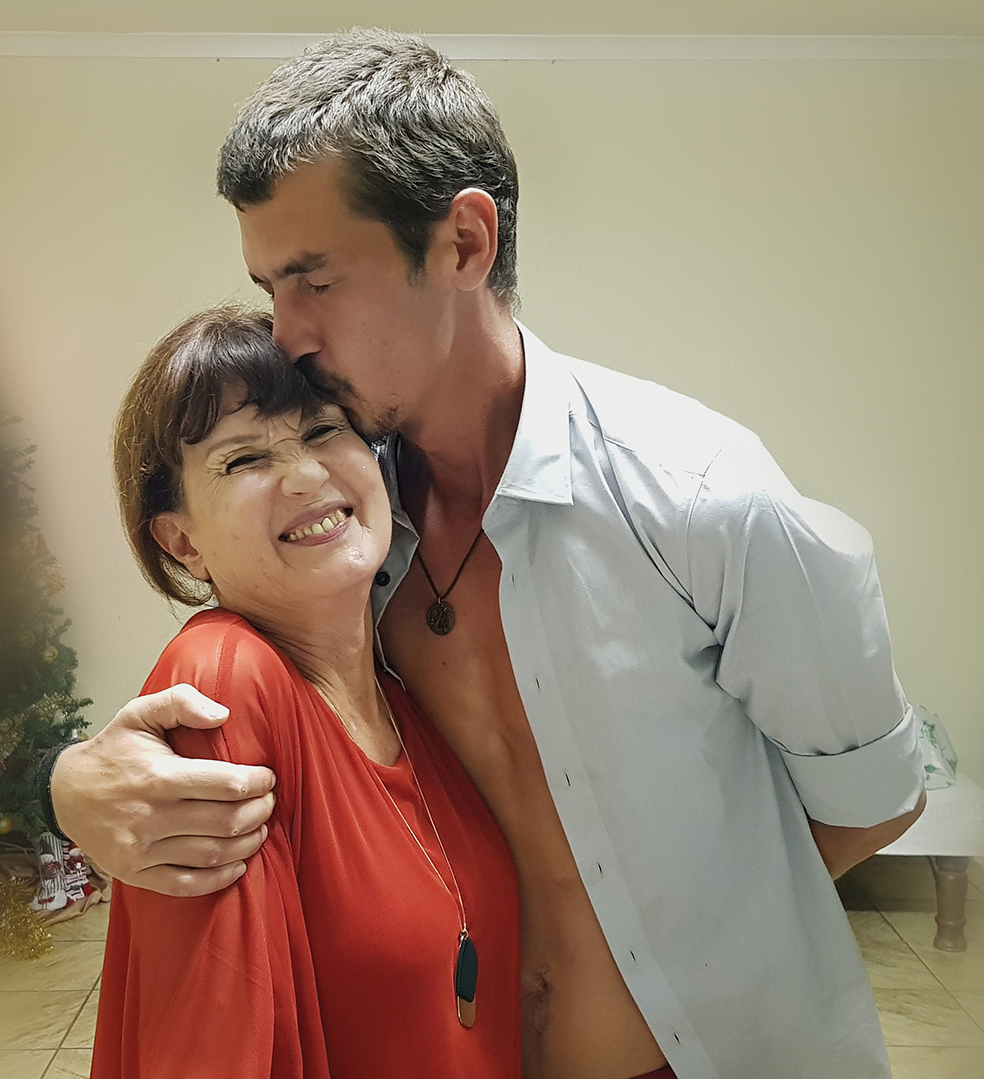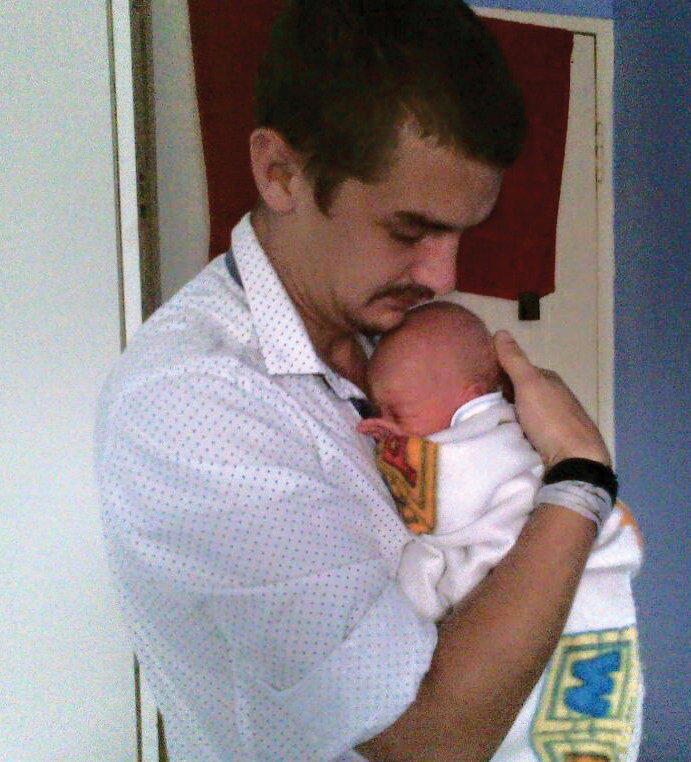[Warning: This story talks about suicide.]
It was the call we’d most dreaded. I heard Thelma’s anguished voice clearly across the surging ocean that separates us: “Please pray, Mum! Lenny’s battling for life. He hanged himself. We’re waiting for the paramedics.”
My response was calm; it’s my way when there’s a crisis. Only God hears the silent scream. He heard it that day. He heard the agonised pleas of a family begging Him, “Please give Lenny another chance.” He saw a group of young people gathered in a park after church as they prayed and rallied around Richard, Thelma’s brother, urgently pleading for Lenny’s life. He marked how earlier that day, Lenny’s sister, Angie, had dropped into the prayer box at church a note saying, “Lord, I’m praying today especially for Lenny.” I know that every prayer ever prayed for Leonard was presented to God in those last moments of his life.
I held Thelma’s hand throughout the birth of my first grandchild. I was there when they placed that newborn on his mum’s breast, plump as a puppy, grunting from the amniotic fluid he’d inhaled. And into the breast of this newborn grandma there sprang a love and a bond that grew stronger as the years went by.
Leonard was a beautiful child with blond curls and a sunny disposition. His blue eyes observed life with a wisdom beyond his years. His young mother had been seduced by the charm and lies of an older man who’d conveniently disappeared once he’d realised she was pregnant.

Angry, disillusioned and fiercely independent, Thelma set out to make her way in the world as a single mother. Lenny suffered much heartache from the insecurity and frustration that this life produced. More serious than the struggle to make ends meet was the unkind treatment that came his way by those men who were willing to be involved with his mother, but not her little boy. As children often do, Lenny blamed himself. His earliest memory was of riding his tricycle in a figure of eight around and around the driveway, while inside his mum and her boyfriend yelled at each other. “Grandma,” he whispered as he told me later, “I knew they were fighting about me.”
The textbooks tell us that loud noises and violence raise the levels of anxiety in the gentle soul who feels helpless amid the turmoil. This sense of frustration can become a deep-seated anger. Anger turned outwards is displayed in violence, but anger turned inwards can metastasise into depression. Leonard was an easy victim for those peddling weed. They assured him that it would sweeten life and ease the nightmares that filled his nights with terror.
In a letter to his uncle, Lenny wrote: “I am of the opinion that I am a melancholic with a loud voice. . . . I have a tendency to use drugs to dull my pain and occupy my mind so that I don’t drive myself insane with thoughts like, How do I become understood? What makes me so misunderstood? Am I stupid, arrogant, stubborn or so beyond most people so that no one sees me?”
Lenny tried to fathom who he was. In one of our discussions on the subject, we recognised that of the four personality types described by the Greek and Arab ancients—sanguine, phlegmatic, choleric and melancholic—we both leaned towards the latter. Melancholic individuals tend to be analytical and detail-oriented. They are deep thinkers and feelers. They are introverted, thoughtful and reserved. They seek to be self-reliant and are often anxious. That summed Lenny up pretty well. Except for the loud voice. His perceptive sister believes that he developed the loud voice in an attempt to be heard.
His lack of a loving, supportive father-figure caused Leonard much heartache. In his anger he distanced himself from God. But not long ago he watched a DVD entitled Seeing God as a Perfect Father by Atlanta pastor Louie Giglio. When the message sank home the phone line virtually crackled with Lenny’s excited words, “Grandma, God is my Father. He is my perfect Father. I can see how He has led me through the years.” It was the beginning of a much better relationship with God, but by no means a perfect one. Lenny’s prayer journal reveals much of his thinking at this time:
26/11/2018
My dearest Father, my Protector, the One who sees all, rebukes when needed, shows all kindness when needed. I come before You again, begging for Your forgiveness for letting go and losing sight of You again.
28/11/2018
Dear Heavenly Father, I know I’m being brief, but thank You for all You have done. I have a problem: I don’t have the depth to stand by You. I want all the things I shouldn’t. You see what’s in my mind and I trust You to understand my unspoken words.
15/12/2018
My Father, what can I do? I’m worn and beaten and don’t have strength. I am broken and feel like there’s no way to fix it. You say You won’t give me something that I can’t handle. If that’s true, I’m a failure or so slow that, at this rate, I’m not even a point of a per cent. I have achieved nothing and have no value to anyone’s life. I trust no one, not even You, not because I don’t want to, but because I’m broken.
I don’t want to learn anymore. I just want it all to stop.
I’ll never forget Lenny’s words when he learned he had made a girl pregnant in spite of their precautions. “I’m not ready to be a dad, Grandma,” he raged. “I’m still dealing with my own stuff and cannot give a child a stable home and adequate paternal guidance.”
His premonition of disaster was realised. Melissa moved away and, although Lenny went to be with her during the birth of little Nathan, he was never able to pull the situation together, no matter how hard he tried. The lack of a steady job made it impossible to pay regular support for his child so Melissa and her family denied him visiting rights. His parting letter reveals his heartache:
Nate, my son,
I did my best to be in your life and I have loved you till my bones have ached. I’m sorry that you have to go through life with just a mother, but it’s for your own good. I would just have hurt and damaged you in a way you could not have come back from.
All the love I have,
Your Dad!!!

Leonard said that he used drugs to dull his pain and help him to find meaning for his life. But although recreational drugs may give a brief sense of relief, that wears off. The pain and anxiety come back and the user is soon seeking the next dose. Instead of helping Lenny, the drugs devastated his life. Drugs affect the mental functions of the brain and cause confused thinking and detachment from reality. The user’s depression is aggravated until it becomes a chronic and often fatal disease. The use of drugs affects the chemical balance of the body and takes its toll on the bones, teeth and hair. Lenny could not eat without pain, which affected his nutrition and caused weight and hair loss.
For Lenny and for those around him, the happiest times were when he was free from his addictions. He longed to be forever free, but believed this was beyond his grasp. In his depressed state he saw himself as a failure, a burden to those around him. Tragically and wrongly, he believed that those close to him would be better off without him. He lost all hope for the future and saw death as the only solution.
But he’d believed a lie. The reality of his life did not match his skewed thoughts. Help was on the way; a place at a rehabilitation centre was earmarked for him the day before he died, but the family were notified too late. If only he’d held on for just one more day . . .
Rather than being of no value to this world, Lenny was loved by young and old alike. Bradley, his seven-year old nephew, said sadly, “I’ll miss the piggy-backs Lenny gave me.” The elderly landlord wept as he told Thelma how he would miss Lenny’s readiness to help with whatever needed to be done. We all miss his quirky sense of humour and his innovative solutions to knotty problems. He phoned me 10 minutes before he took his life, but I didn’t hear the phone ring. Our chats always resurrected hope in his heart. If only . . .
And so, indeed, we are left with the useless “if onlys”. The “could haves”, “would haves” and “should haves”. We are left with the aching void of a precious life lost. Leonard’s pain is over; ours has just begun.
If ever there’s been an example of a person impacted by a broken world and taking a path contrary to God’s rules for abundant life, it’s Lenny. He had no right to take his own life. Only God, the Giver of life, has the right to take it. He gave His own life, died rejected and alone, to rescue those who had fallen into desperation. This gives Him the sole right to judge the Lennys of the world and claim them as His own. For all Lenny’s mixed-up thinking, I’m glad that, as his final journal entry shows, he went to his rest not fearing God’s condemnation, but with a firm belief in his Father’s amazing grace.
The song Who Am I? by Casting Crowns meant a lot to Lenny—there were times when it cut through his despair and anguish, and spoke hope and peace to his soul. It gave him a sense of his true identity. I wish he’d been able to hold on to its message more firmly. It’s a prayer to God that I hold close to my heart:
Not because of who I am
But because of what You’ve done
Not because of what I’ve done
But because of who You are. . . .
I am Yours.
If you or someone you know needs help, contact:
Lifeline: 13 11 14 Australia | 0800 54 33 54 New Zealand
This article first appeared in Signs of the Times magazine.
WIN CHILDREN’S BOOKS!
Submit a personal story on your parenting journey, thoughts or experience and if we use your story, we’ll send you a selection of children’s books! Write to us at editorial@MumsAtTheTable.com.
How helpful was this article?
Click on a star to rate it!
5 / 5. 1
Be the first to rate this post!
Aleta Bainbridge
Related posts
Subscribe
Receive personalised articles from experts and wellness inspiration weekly!

